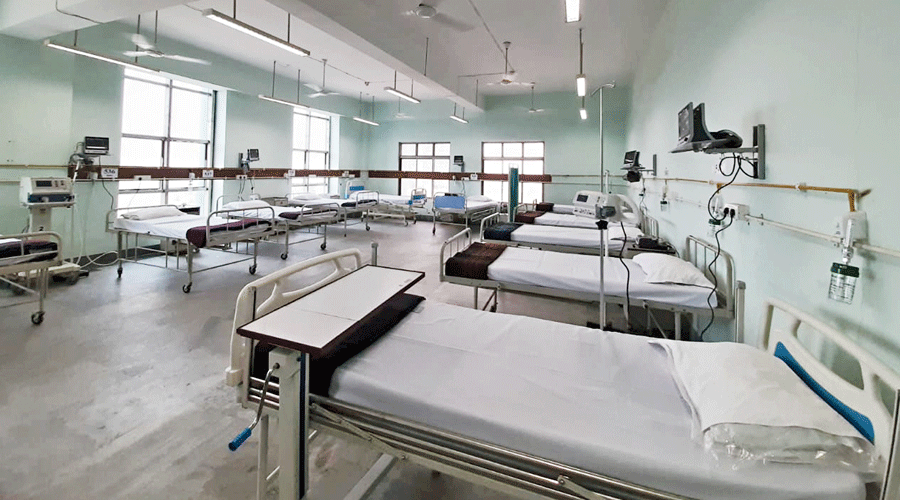Shorter stay because of milder symptoms has seen most hospitals in Kolkata tackle the third wave of Covid infections with much less bed occupancy compared with the first two waves, said hospital officials and doctors.
The average stay of a Covid patient in the third wave was four to seven days in the general Covid ward of several hospitals.
In the second wave, the average stay was between 10 and 17 days.
In the critical care units, too, the average stay was shorter for many Covid patients in the third wave.
Officials of several hospitals said the shorter stay during the third wave was the reason why they did not have to increase the number of Covid beds to the extent of the second wave, resulting in fewer disruptions to non-Covid treatment.
Experts have said most Covid patients during the third wave, driven by the highly contagious Omicron variant of the coronavirus, were asymptomatic or suffered from mild disease.
Belle Vue Clinic on Tuesday converted all its general ward Covid beds into non-Covid ones. “For the first time since the outbreak of Covid-19 in India in March 2020, Belle Vue has no Covid general ward bed,” said an official of the private hospital.
There were only five critical care Covid beds on Tuesday.
“If anyone is getting admitted on an emergency basis, we are keeping him or her in the suspected Covid ward till the patient tests negative,” said Pradip Tondon, CEO of Belle Vue.
Doctors cited two factors that were mostly responsible for shorter hospital stays of Covid patients.
One was the revised guideline of the health ministry, which reduced the isolation period of Covid patients to seven days.
“Many patients who are getting admitted with other medical problems but are diagnosed with Covid during routine tests are being shifted to non-Covid wards after seven days,” said Chandramouli Bhattacharya, infectious diseases expert at Peerless Hospital.
The other factor, he said, was that “there have been fewer Covid patients with moderate to severe symptoms” during the third wave.
“So we are able to discharge them early. The involvement of the lungs, leading to the requirement of oxygen support, was very less in the third wave,” he said.
Three or four Covid patients are being admitted to the hospital every day but the occupancy in the Covid wards has remained 50 per cent or even less.
“Because of the high rate of discharge and shifting of patients to non-Covid wards, only 22 of the 41 Covid beds were occupied on Tuesday,” said Sudipta Mitra, chief executive of Peerless Hospital.
The RN Tagore International Institute of Cardiac Sciences had 250 beds at the peak of the second wave. This time, the Covid bed count rose to only 150.
“We had to keep 250 beds for Covid treatment for one-and-a-half months during the second wave. This time we were able to climb down from 150 beds within two weeks,” said R. Venkatesh, regional director, east, Narayana Health, which runs the RN Tagore hospital.
“The shorter stay ensured there was no crisis of beds this time, unlike during the second wave.”
Sivaresmi Unnithan, consultant pulmonologist at Fortis Hospital, said the average stay of a Covid patient at their facility is two to three days.
“Some patients were admitted in the day-care to administer the antibody cocktail drugs. Those in need of antiviral drugs are staying for five to six days. Otherwise, the average stay is much shorter,” said Unnithan.
During the second wave, the hospital would get much sicker patients and the average stay in the ward would be 10 to 12 days, she said.
